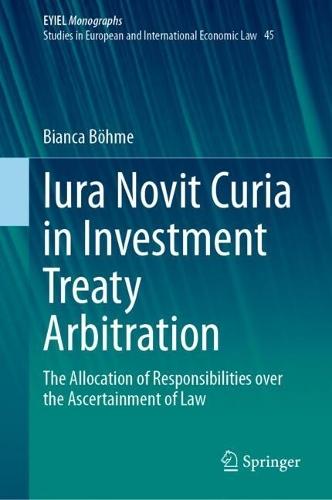Overview
How much legal discretion do arbitrators truly have in investment treaty arbitration? Iura novit curia – literally ""the judge knows the law"" – is a well-established procedural principle across various legal systems, empowering and/or requiring adjudicators to ascertain and apply the law independently, even beyond the arguments presented by the parties. Yet, its specific role in investment treaty arbitration remains largely unexplored. This book presents a comprehensive and in-depth examination of iura novit curia in investment treaty arbitration. Against the backdrop of ongoing global reforms of the international investment protection regime, the principle holds the potential to enhance accurate decision-making and reinforce the substantive equality of arms between parties. The book traces the historical development of iura novit curia, from Roman law to contemporary civil and common-law procedures, providing a comparative foundation for its modern application. It then examines how international courts and tribunals allocate responsibility for legal ascertainment, exploring its role in public international law and international commercial arbitration. Building on this background, the book shifts its focus to the core question: whether and how iura novit curia should be applied within the unique legal framework of investment treaty arbitration. In this context, the book inter alia addresses the following legal questions: On which legal basis can iura novit curia be applied in investment treaty arbitration? Does its application align with the policy objectives driving the ongoing reform of the international investment protection regime? Is the independent ascertainment of law a power or a duty for investment arbitrators? After answering these foundational questions, the book then delves into the two main elements of iura novit curia: the notion of legal knowledge and the ex officio ascertainment of law. It critically examines the level of legal knowledge expected from investment arbitrators and whether specific knowledge requirements should be mandatory. Regarding the ascertainment of law, it explores the role of different methods – reliance on party submissions, external experts, autonomous interpretations, and the introduction of new legal sources – while also analysing the procedural constraints arbitrators face when independently ascertaining the applicable law.
Full Product Details
Author: Bianca Böhme
Publisher: Springer Nature Switzerland AG
Imprint: Springer Nature Switzerland AG
ISBN: 9783032024015
ISBN 10: 3032024013
Pages: 184
Publication Date: 17 October 2025
Audience:
Professional and scholarly
,
Professional & Vocational
Format: Hardback
Publisher's Status: Forthcoming
Availability: Not yet available

This item is yet to be released. You can pre-order this item and we will dispatch it to you upon its release.
Author Information
After completing her legal studies in Chile, Bianca Böhme obtained an LL.M. in international law, trade, investment and arbitration from the University of Chile and Heidelberg University as well as an additional LL.M. in European and international law from Saarland University. Subsequently, the author finished her doctoral studies at Saarland University. This book is based on her doctoral thesis, which was defended in Saarbrücken in February 2025. During her doctoral studies, the author regularly lectured and published on topics related to international arbitration, international investment law and European Union law. Currently, she works as an international arbitration lawyer at Busse Disputes in Frankfurt am Main.



